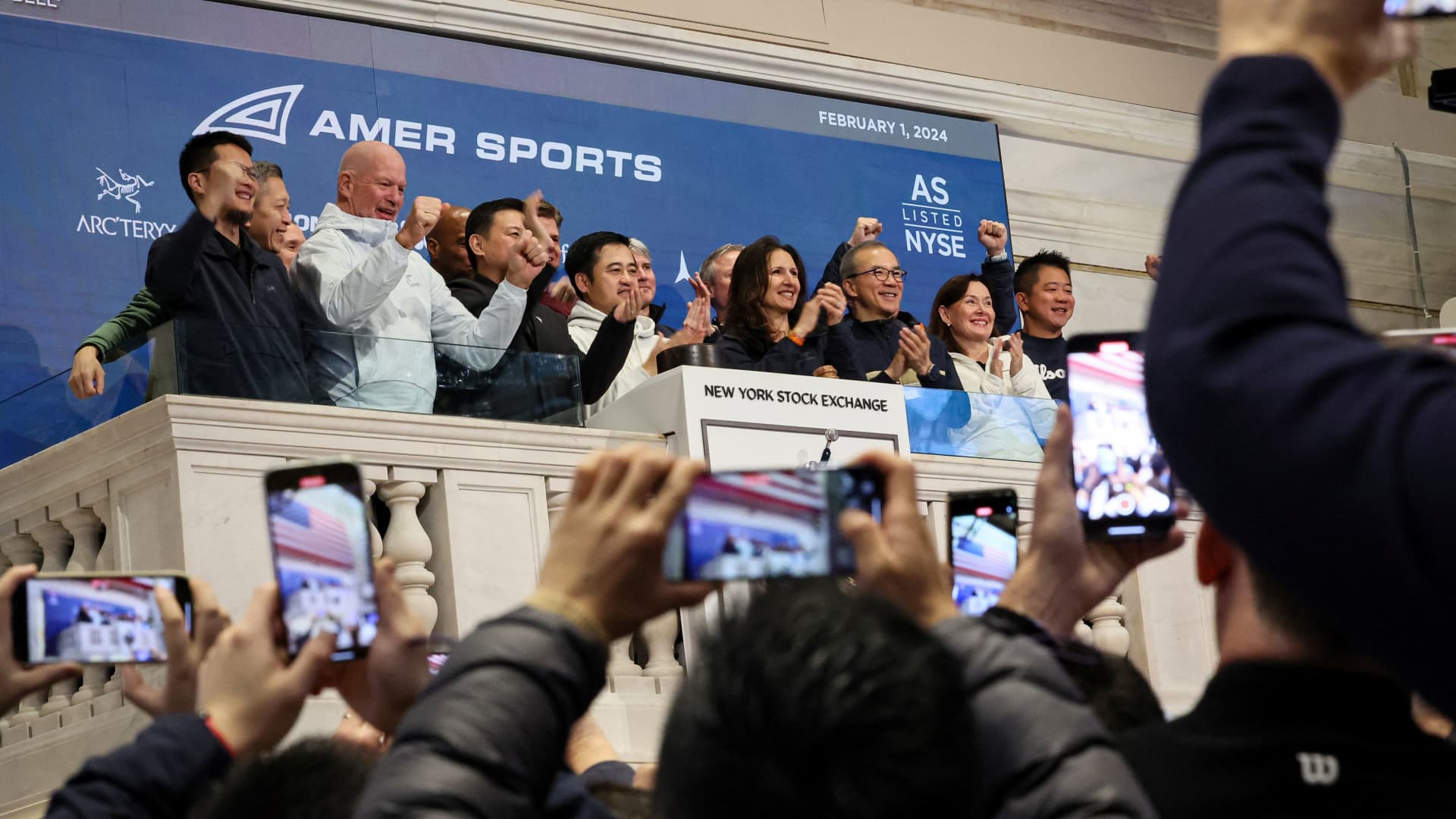Wilson products at the Paragon Sports store in the Chelsea neighborhood of New York on Jan. 4, 2024.
Jeenah Moon | Bloomberg | Getty Images
Amer Sports, the Finnish athletic company behind the Wilson tennis racket and Arc’teryx, made a muted debut on the public markets Thursday, as shares rose 3% after it priced its initial public offering at a discount.
The stock opened at $13.40 a share on the New York Stock Exchange under the ticker “AS” and closed at the same price. Based on the closing share price and the company’s 484 million outstanding shares, Amer Sports has a rough market capitalization of about $6.49 billion.
Amer had priced its IPO at $13 per share and raised $1.37 billion in the offering. It had originally expected to offer 100 million shares at $16 to $18 each.ÂÂ
The offering valued Amer at about $6.3 billion, down from a previous valuation of up to $8.7 billion.ÂÂ
When Amer debuted, only 2.5 million shares traded, which indicates little sell-side interest and is low for an offering of 105 million shares. Typically, bookrunners would try to open with around 10% of shares, which would be about 10 million shares.
Amer’s decision to discount its IPO came after Federal Reserve Chair Jerome Powell indicated the central bank isn’t ready to start cutting rates, casting a pall over market sentiment and the floundering IPO market.
Wall Street has been eager to see a resurgence in the IPO market after it grounded nearly to a halt over the past two years, but recent debuts, including from German shoemaker Birkenstock, have been muted and failed to impress.ÂÂ
While demand has fallen in the overall consumer discretionary sector, Amer’s finance chief Andrew Page said its target consumers have been resilient and continued to choose its brands.
“Our focus always has been to make the best products in their category in the world. Our products are steeped in innovation, our consumers appreciate quality and innovation and newness,” Page said. “That is at the core of who we are as a company, that’s at the core of what we deliver to the market.”
He said he isn’t concerned with Amer’s stock performance on any single day, and the company is more focused on executing its long-term strategy.
Executives of Amer Sports celebrate the company’s initial public offering at the New York Stock Exchange in New York City on Feb. 1, 2024.
Brendan McDermid | Reuters
Amer runs some of the most recognizable brands in the athletic space, but its balance sheet is saddled with $2.1 billion in debt, and it didn’t post any profits between 2020 and September 2023, according to a securities filing.
In the nine months ending Sept. 30, 2023, the company saw $3.05 billion in revenue, up from $2.35 billion in the same period a year ago. It posted a net loss of $113.9 million during the period, higher than the $104.4 million it lost in the year-ago period.ÂÂ
In an interview with CNBC, CEO James Zheng said Amer plans to use the proceeds from the IPO to improve its balance sheet and fund growth initiatives at Wilson, Arc’teryx and Salomon. He pointed out that Arc’teryx, known for its pricy winter jackets, has very low unaided brand awareness in North America, particularly in the U.S., so there’s a lot of room to grow.
Investors also had concerns about Amer’s ties to China and its reliance on the region, according to a person familiar with the matter.
The company’s business in China has been growing at a time when tensions are rising between the U.S. and Beijing. Many companies are trying to diversify their market share so they’re not as exposed to disruptions in the region.ÂÂ
In 2020, Amer did 8.3% of its business in Greater China and in 2022, that figure nearly doubled to 14.8%. In the nine months ending Sept. 30, 19.4% of sales came from the region.ÂÂ
In response, Zheng said “its quite important” for sporting goods companies to build a strong footprint in China and so far, Amer has seen “a big return” on its investment in the region. He added that while the region is “important” to the company, “it’s just part of the whole.”
“Our biggest market is still in North America representing 40% of business and Europe represents 32%. China right now only represents 20%, so it’s a part of the business,” said Zheng. “We are a global company.”
 Additional reporting by CNBC’s Bob Pisani.
Don’t miss these stories from CNBC PRO:
Read the original article here


